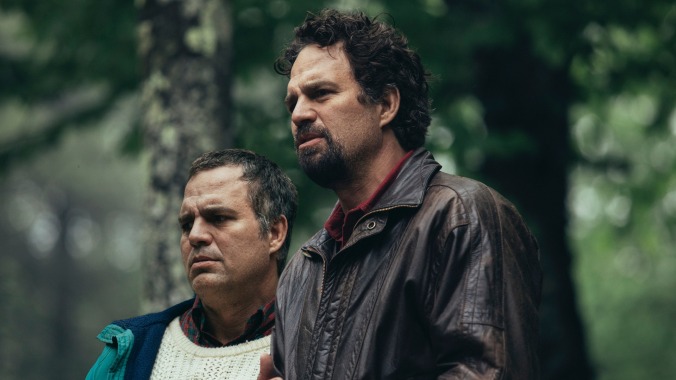Mark Ruffalo’s at the top of his game in the rich but unrelenting I Know This Much Is True


Over one hundred countries are experiencing some form of lockdown, the global economy is in free fall, and the last time you saw your loved ones was probably over a frozen Zoom screen. If you aren’t already mired in sadness, here comes HBO’s I Know This Much Is True to fully extinguish any spark of levity you might have had left.
Derek Cianfrance (Blue Valentine, The Place Beyond The Pines) has adapted Wally Lamb’s sprawling bestselling Oprah-approved novel of the same name into a six-episode limited series. The family saga centers on twin brothers Dominick and Thomas Birdsey, both played by Mark Ruffalo at the top of his game; the former is a divorced fortysomething housepainter, the latter a paranoid schizophrenic. Dominick feels shackled by Thomas’ battles, holding both a sense of obligation and simmering resentment toward his brother. The tension comes to the forefront when Thomas cuts off his hand as a sacrifice to atone for Operation Desert Storm. His act of self-mutilation sets Dominick off on a mission to release him from the facility the state has put him in, as he confronts his own demons about his family’s past and the unknown identity of his biological father.
The discovery of who sired the Birdsey twins is the closest thing the story has to a hook, but the miniseries cares less about the mystery than it does about exploring how power and abuse shape an individual and, by extension, a community. Not exactly the easiest pitch, which makes one wonder who this will appeal to. Fans of the novel are the obvious choice and perhaps the easiest ones to be seduced by a premise that can best be described as the Book of Job: We Are All Job. Those who tune into it for the dynamite cast including Melissa Leo, Rosie O’Donnell, Archie Panjabi, John Procaccino, Kathryn Hahn, Juliette Lewis, Philip Ettinger, Rob Huebel—to name a few—will find other rewards.
The calamities that befall Dominick’s family and everyone he comes into contact with is like an inventory of terrible tragedies: domestic abuse, sexual abuse, cancer, SIDS, HIV, crumbling health infrastructures, racism, sexism, murder, the mistreatment of Native American communities, Reaganomics, the first Bush years, exploitation of immigrants—the story is mainly set in the ’90s, with a few flashbacks into Vietnam War years and the first half of the twentieth century.
The narrative is relentless when it comes to its misery, and the visual choices only double down on the perpetual feeling of gloom. Cianfrance, who wrote and directed all six episodes, is an expert at setting a sorrowful mood, and he doesn’t hold back just because his medium is now the small screen. We are in a Connecticut that is perpetually on the verge of rain; the color palette is gray, blueish gray, and off-gray. The camera is in love with claustrophobic close-ups of actors’ faces, just to make sure we can never catch our breath or even get a visual rest. There is something subtly subversive about creating a drama that goes against what so many viewers want. This is not a show to be binge-watched, unless you really have a hankering to wallow, and there are no cliffhangers to lure back viewers each week.
On the other hand, I Know This Much Is True may not be an enjoyable watch, but it still manages to be an arresting one, thanks to the stellar performances of an impeccable cast. It’s a bit of an industry cliché to view the role with the most demanding physical transformations as awards bait, and Ruffalo’s turn as Thomas is definitely noteworthy. Still, it’s his performance as Dominick, and his ability to go from open wound to pent-up rage and back, that ends up being more mesmerizing. But the series is full of heavy hitters. Rosie O’Donnell is a revelation as Lisa Sheffer, the no-nonsense social worker who helps Dominick navigate his brother’s case. Melissa Leo is a haunting whisper on the screen as the brothers’ subservient mother. As Dominick’s ex-wife, Kathryn Hahn manages to exude strength even in her most quiet moments and Archie Panjabi is a soothing, compassionate presence as psychologist Dr. Patel. Philip Ettinger, who plays the twins during their college years, also deserves praise for bringing depth and nuance to what is eventually a spiral into darkness. John Procaccino adds complexity to the role of Dominick’s abusive stepfather, a character that could so easily be vilified.
It’s the caliber of these performances that tilt I Know This Much Is True to the category of prestige television, considering how it could have very easily teetered into a Lifetime tearjerker. The show works best when it opts for heartfelt conversations between the characters than the bleak theatrics of, say, a morphine-induced dream after a devastating car crash. As the problems for Dominick pile up, the pacing sags in the middle, right when it should actually be reaching a fever pitch. Thankfully, the story picks back up again when we are introduced to Domenico Tempesta, the twins’ deplorable grandfather, whose self-aggrandizing autobiography is key to finding out the secret of their heritage.
I Know This Much Is True can be an uneven journey, overwhelming in its self-indulgent trauma and soaring when it examines the parallels between our individual transgressions and the grand scale sins that forged this nation. One wishes this theme would have been further explored instead of weakening its punch. There are some payoffs, however, to sticking with the miniseries throughout that go beyond the big reveal of the mystery father. Against all odds, it ends on a more heartfelt and hopeful note than the preceding six hours would lead you to believe. But the question is, do you really want to spend six hours of your life feeling as sad as can possibly be?